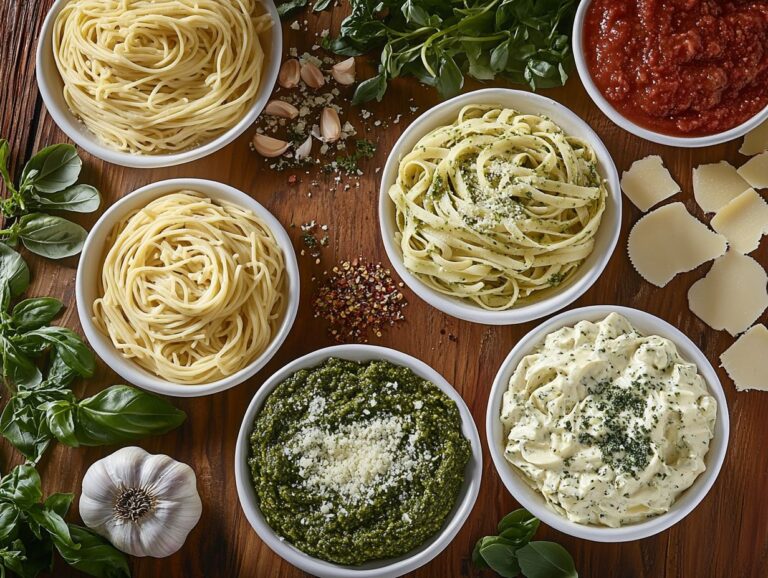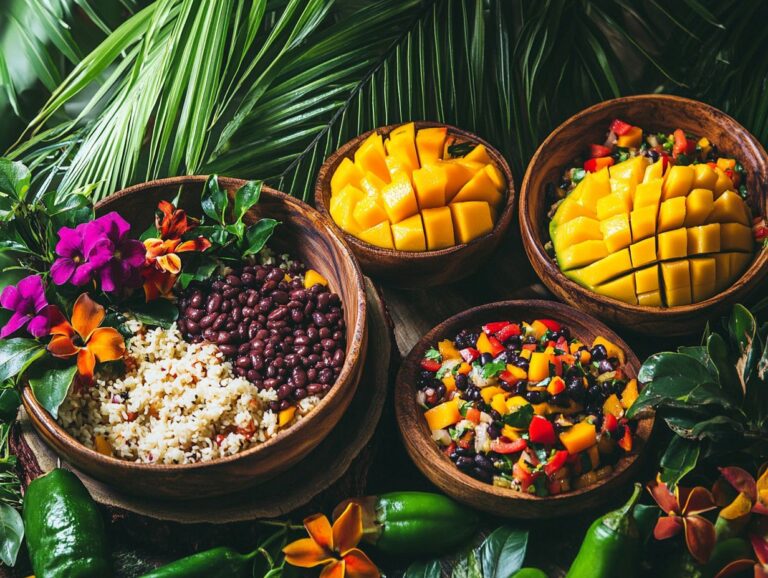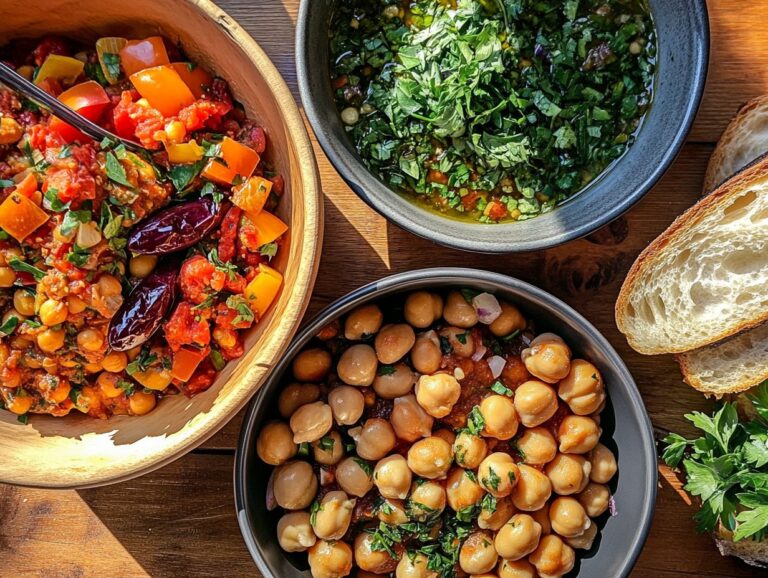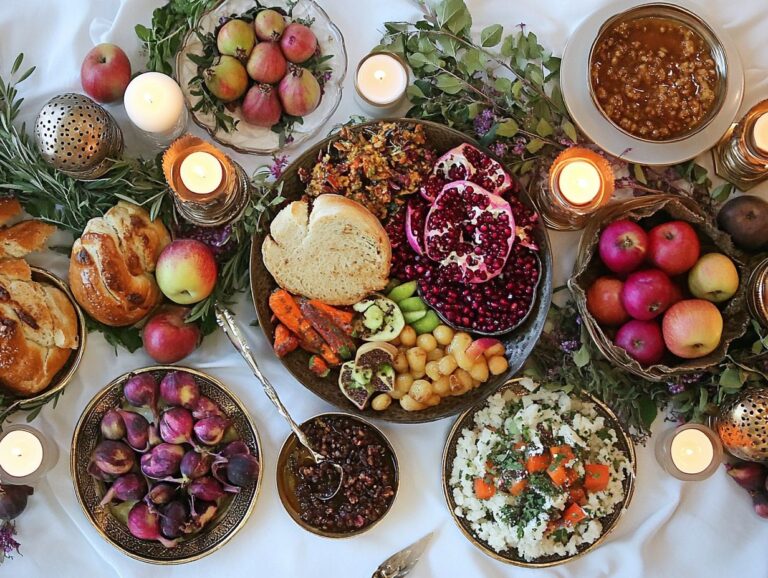Egyptian cuisine, renowned for its rich history and diverse flavors, offers a treasure trove of ingredients that can be easily adapted for a vegan lifestyle. This exploration highlights the vibrant intersection of traditional Egyptian dishes and plant-based eating, showcasing authentic recipes infused with Middle Eastern spices. Discover how to create classic Egyptian meals with a vegan twist, learn about nutritious substitutions, and find tips for seamlessly incorporating these delightful dishes into your everyday diet. Experience the essence of Egypt while embracing a healthier, plant-based approach!
Egyptian Cuisine and Veganism
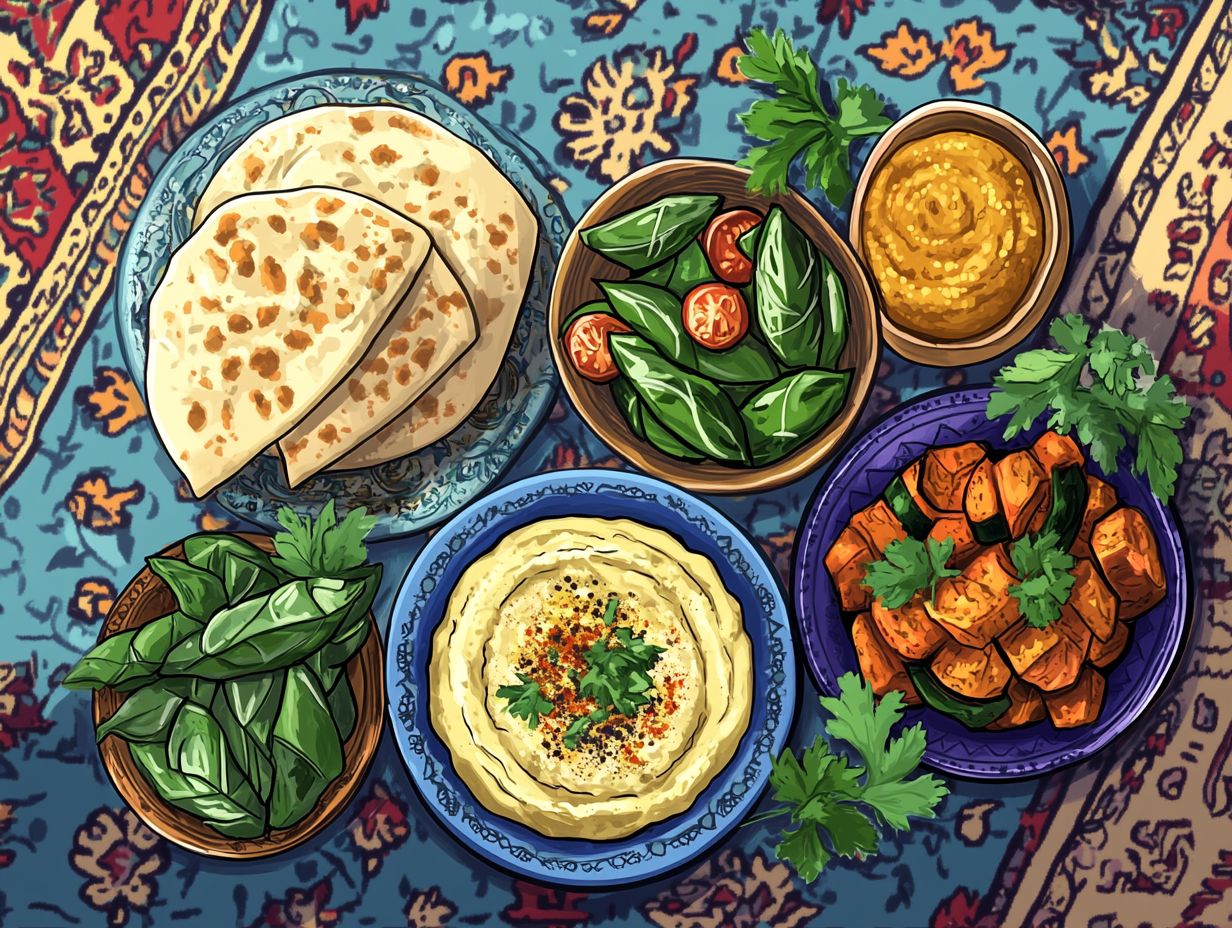 Egyptian cuisine is a rich and traditional culinary art that is deeply intertwined with Egyptian culture, boasting a history that spans thousands of years. It features a variety of savory dishes that are easy to prepare and include a mix of high-protein ingredients like fava beans and chickpeas. As global awareness of health and sustainability increases, the fusion of veganism with traditional Egyptian recipes offers a captivating culinary experience. This blend of Mediterranean flavors and vegan ingredients such as pomegranate molasses and roasted cauliflower opens new avenues for delicious and healthy meals. By emphasizing plant-based ingredients, these recipes not only celebrate the authentic flavors of Mediterranean cuisine but also embrace a modern approach to veganism that appeals to families seeking healthy and wholesome meals. With the inclusion of vegan cheese and nutritional yeast, even the most traditional Egyptian dishes can be enjoyed with a creamy and tasty vegan twist. This blending of traditions fosters a greater appreciation for Egyptian culture while promoting nutrition and sustainability. By incorporating a variety of spices and herbs such as garlic, cumin, and parsley, these dishes offer a simple yet flavorful dining experience that is both time-saving and nutritious.
Egyptian cuisine is a rich and traditional culinary art that is deeply intertwined with Egyptian culture, boasting a history that spans thousands of years. It features a variety of savory dishes that are easy to prepare and include a mix of high-protein ingredients like fava beans and chickpeas. As global awareness of health and sustainability increases, the fusion of veganism with traditional Egyptian recipes offers a captivating culinary experience. This blend of Mediterranean flavors and vegan ingredients such as pomegranate molasses and roasted cauliflower opens new avenues for delicious and healthy meals. By emphasizing plant-based ingredients, these recipes not only celebrate the authentic flavors of Mediterranean cuisine but also embrace a modern approach to veganism that appeals to families seeking healthy and wholesome meals. With the inclusion of vegan cheese and nutritional yeast, even the most traditional Egyptian dishes can be enjoyed with a creamy and tasty vegan twist. This blending of traditions fosters a greater appreciation for Egyptian culture while promoting nutrition and sustainability. By incorporating a variety of spices and herbs such as garlic, cumin, and parsley, these dishes offer a simple yet flavorful dining experience that is both time-saving and nutritious.
The Intersection of Culture and Diet
The intersection of culture and diet is vividly reflected in Egyptian cuisine, where traditional meals are often enjoyed during family gatherings that celebrate heritage and community. These gatherings not only provide nourishment but also foster a sense of belonging, making the dining table a focal point for connection and joy. Incorporating classic dishes like koshari and vegan Foul-Mudammas into breakfast options can offer a nutritious start to the day, bringing Middle Eastern traditions into every meal. As dietary preferences shift towards veganism, many families are finding innovative ways to adapt cherished dishes while honoring their culinary roots. For example, classic recipes like koshari, which traditionally includes lentils and rice, can be enhanced with a variety of vegetables to create a fully plant-based version that maintains its flavor and nostalgic appeal. This transition not only reflects individual health choices but also encourages a broader cultural dialogue about food sustainability, allowing individuals to embrace modern trends while preserving essential traditions.
Traditional Egyptian Ingredients
Traditional Egyptian cuisine is renowned for its diverse and flavorful ingredients, which are staples in many households. Key components include fava beans, garlic, cumin, and fresh herbs such as parsley. These ingredients come together to create a culinary experience that is rich in both history and flavor. Furthermore, traditional Egyptian food offers a variety of nutritional benefits that align well with a vegan diet. The inclusion of items like chickpeas, lentils, and olives ensures that meals are not only protein-rich but also infused with flavors that reflect the Mediterranean heritage of this vibrant cuisine.
Plant-Based Alternatives and Substitutions
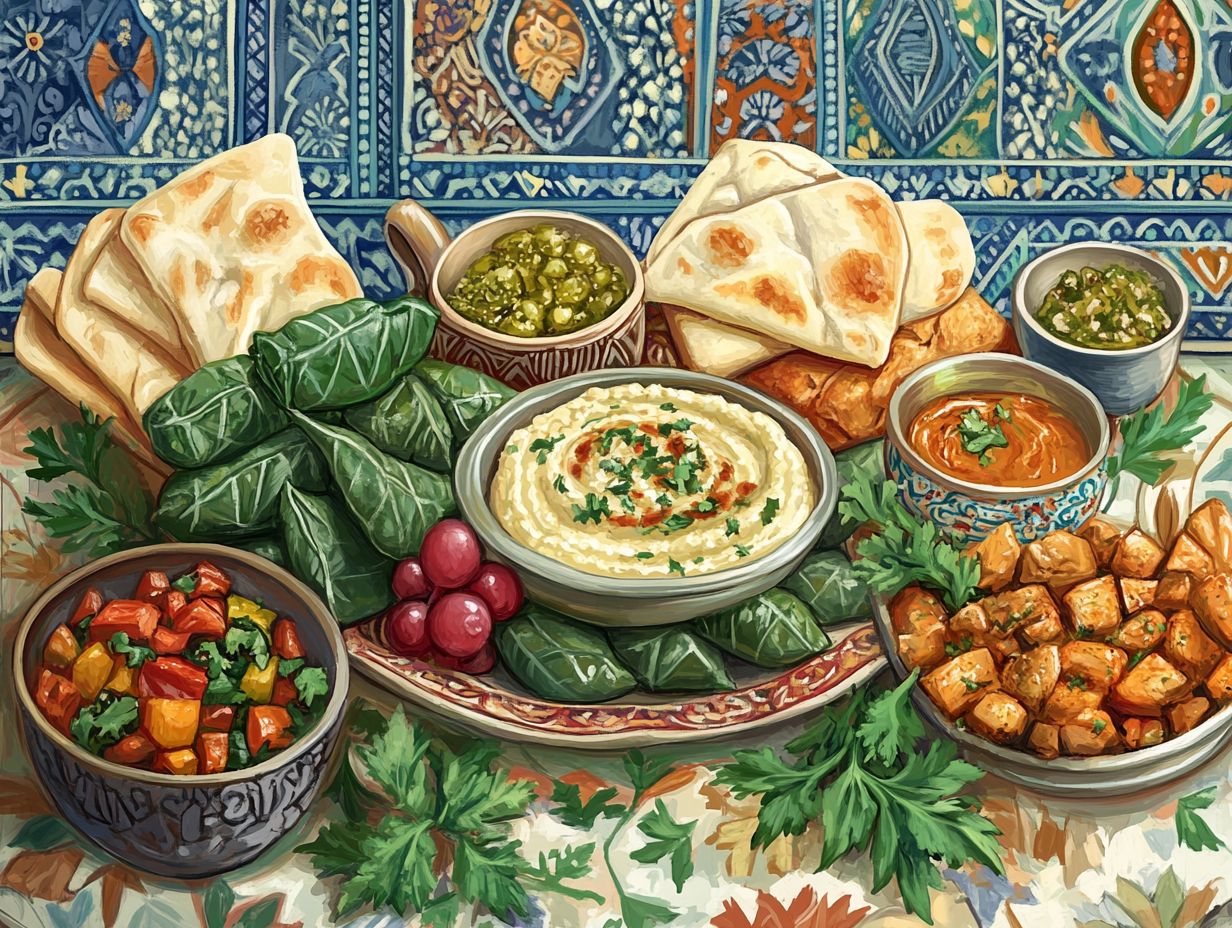 Plant-based alternatives and substitutions in Egyptian cooking enable the creation of authentic vegan recipes without sacrificing taste or health benefits. Vegan Cheese: This is an excellent plant-based alternative that can be added to traditional Egyptian dishes like Koshari or stuffed peppers, providing the creaminess typically associated with dairy cheese. Tahini: An essential ingredient in many Egyptian recipes, tahini is a fantastic vegan option. Frequently used in sauces and dips, it serves as a suitable replacement for vegan cheese and yogurt alternatives, adding a rich flavor. Made from ground sesame seeds, tahini contributes a nutty taste that enhances dishes such as baba ghanoush, foul medames, and tahini sauce. Yogurt: In Egyptian dishes like lentil soup and salad dressings, dairy yogurt can be substituted with plant-based alternatives made from almond or coconut milk. While these alternatives provide a similar texture, they may lack the tanginess of dairy yogurt. This tanginess can be restored by using a fermented yogurt alternative or by mixing in lemon juice. By incorporating these alternatives, many traditional flavors of Egyptian cuisine can be preserved, allowing everyone to enjoy nutritious, cruelty-free versions of these beloved recipes.
Plant-based alternatives and substitutions in Egyptian cooking enable the creation of authentic vegan recipes without sacrificing taste or health benefits. Vegan Cheese: This is an excellent plant-based alternative that can be added to traditional Egyptian dishes like Koshari or stuffed peppers, providing the creaminess typically associated with dairy cheese. Tahini: An essential ingredient in many Egyptian recipes, tahini is a fantastic vegan option. Frequently used in sauces and dips, it serves as a suitable replacement for vegan cheese and yogurt alternatives, adding a rich flavor. Made from ground sesame seeds, tahini contributes a nutty taste that enhances dishes such as baba ghanoush, foul medames, and tahini sauce. Yogurt: In Egyptian dishes like lentil soup and salad dressings, dairy yogurt can be substituted with plant-based alternatives made from almond or coconut milk. While these alternatives provide a similar texture, they may lack the tanginess of dairy yogurt. This tanginess can be restored by using a fermented yogurt alternative or by mixing in lemon juice. By incorporating these alternatives, many traditional flavors of Egyptian cuisine can be preserved, allowing everyone to enjoy nutritious, cruelty-free versions of these beloved recipes.
Authentic Vegan Egyptian Recipes
Vegan Egyptian recipes like Foul-Mudammas, Bessara, and koshari showcase the rich flavors and culinary heritage of Egypt while remaining plant-based, making them accessible to a broader audience. These savory dishes are often affordable and healthy, providing convenient meal prep options. The use of familiar flavors such as garlic, cumin, and lemon underscores the versatility of traditional cooking, allowing it to adapt to modern dietary preferences.
Classic Dishes with a Vegan Twist
With thoughtful modification and creativity, classic Egyptian dishes can be transformed into vegan versions. This approach not only enhances the appeal of the dishes but also preserves the flavor profiles that make them popular. For instance, Foul-Mudammas can be prepared with tahini instead of butter, maintaining the creaminess and nutty flavor without using animal products. Incorporating smoked paprika and fresh herbs can further enhance the dish’s flavor, providing a depth that appeals to all palates. Similarly, Bessara can be made with coconut yogurt instead of cow’s yogurt, preserving the dish’s tanginess while adding a subtle hint of sweetness. These modifications allow the essence of the original dishes to be maintained, enabling everyone to enjoy the delight of classic Egyptian cuisine in a vegan form.
Step-by-Step Preparation and Cooking Instructions
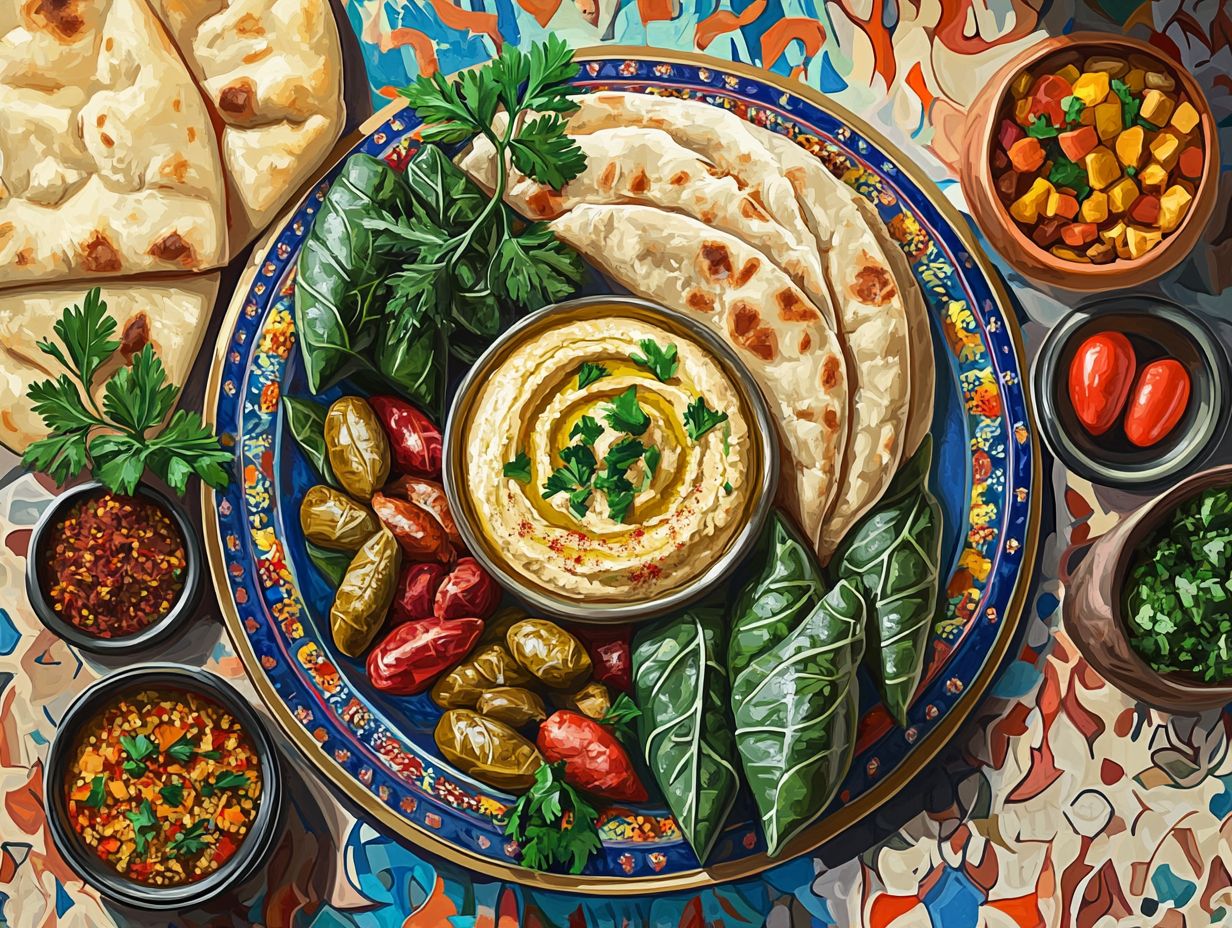 Step-by-step preparation and cooking instructions are essential for recreating authentic vegan Egyptian dishes while preserving their flavors and nutritional value. These guidelines are beneficial for chefs of all skill levels, as they clearly outline each stage of the cooking process, leading to successful results in the kitchen. A deeper understanding of techniques, such as soaking legumes, layering spices, and managing cooking times, is facilitated by paying attention to detail. Noting specifics such as the importance of selecting ripe vegetables and achieving the right textures can significantly enhance the final dish. By emphasizing easy-to-follow steps, we increase the likelihood that everyone can appreciate the rich, wholesome nature of these dishes and cultivate a passion for plant-based cooking.
Step-by-step preparation and cooking instructions are essential for recreating authentic vegan Egyptian dishes while preserving their flavors and nutritional value. These guidelines are beneficial for chefs of all skill levels, as they clearly outline each stage of the cooking process, leading to successful results in the kitchen. A deeper understanding of techniques, such as soaking legumes, layering spices, and managing cooking times, is facilitated by paying attention to detail. Noting specifics such as the importance of selecting ripe vegetables and achieving the right textures can significantly enhance the final dish. By emphasizing easy-to-follow steps, we increase the likelihood that everyone can appreciate the rich, wholesome nature of these dishes and cultivate a passion for plant-based cooking.
Middle Eastern Flavors in Vegan Egyptian Cooking
Middle Eastern flavors play a significant role in vegan Egyptian cuisine. Key ingredients such as garlic, cumin, and fresh parsley are staples of traditional Egyptian cooking, adding depth of flavor and authenticity to vegan dishes. These spices not only enhance the taste of meals but also offer various health benefits, making them essential components of any vegan diet. Their distinct flavors and aromas connect diners to the region’s culinary heritage, demonstrating how a variety of traditional spices can transform simple meals into delicious and wholesome creations.
Spices and Seasonings for Authentic Taste
Using the right spices and seasonings is essential for achieving an authentic taste in vegan Egyptian recipes, with garlic, cumin, and fresh lemon zest contributing to a distinctive flavor profile. These ingredients not only enhance the flavor but also reflect the region’s rich culinary heritage. Garlic serves as a strong base in many traditional recipes, providing depth and warmth to the dishes. Cumin imparts a warm, earthy flavor that can be seamlessly integrated into vegan stews and beans, adding nutritional value while preserving traditional taste. Fresh lemon zest adds brightness, cutting through the richness of plant-based proteins like chickpeas and fava beans, and perfectly balancing the flavors with the help of tart pomegranate molasses. When creating vegan versions, it’s important to combine spices mindfully; for instance, toasting cumin seeds before grinding them can release essential oils, adding not only aroma but also authentic layers of flavor to the dish.
Health Benefits of Vegan Egyptian Cuisine
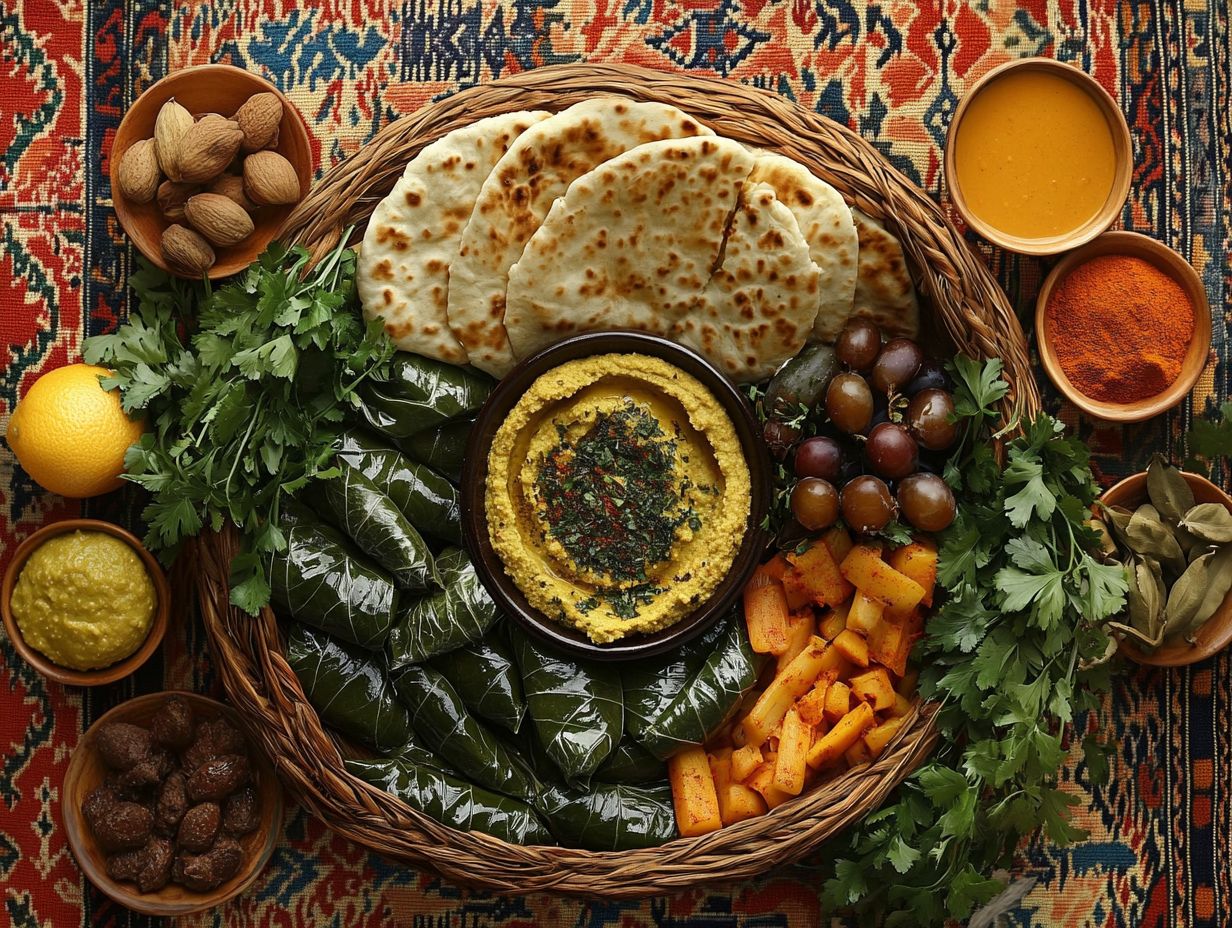 The health benefits of vegan Egyptian cuisine are significant, primarily due to its use of fava beans, chickpeas, and lentils. These ingredients, including lentils and chickpeas, are excellent sources of protein and are rich in vitamins and minerals. The emphasis on plant-based meals aligns with modern eating patterns and promotes a healthy heart and lifestyle. Incorporating vegan-friendly ingredients such as nutritional yeast and pomegranate molasses can further enhance the health benefits of these traditional dishes. Furthermore, this approach is consistent with the inherent wholesomeness and balance of the Mediterranean diet.
The health benefits of vegan Egyptian cuisine are significant, primarily due to its use of fava beans, chickpeas, and lentils. These ingredients, including lentils and chickpeas, are excellent sources of protein and are rich in vitamins and minerals. The emphasis on plant-based meals aligns with modern eating patterns and promotes a healthy heart and lifestyle. Incorporating vegan-friendly ingredients such as nutritional yeast and pomegranate molasses can further enhance the health benefits of these traditional dishes. Furthermore, this approach is consistent with the inherent wholesomeness and balance of the Mediterranean diet.
Nutritional Benefits and Advantages
The nutritional benefits of vegan Egyptian food are significant, particularly due to its high protein content derived from plant-based sources like fava beans and lentils. These staples not only offer protein but also supply essential vitamins, minerals, and fiber, promoting overall health and aiding digestion. The diverse array of vegetables and spices used in dishes such as koshari and ta’ameya enhances the nutritional value of the meals, providing antioxidants that can help combat inflammation and chronic diseases. To achieve a balanced diet, it is advisable to incorporate a wide variety of ingredients, including whole grains, nuts, and seeds, which provide essential amino acids, healthy fats, and carbohydrates. Additionally, paying attention to nutrients like vitamin B12, iron, and omega-3 fatty acids is crucial for ensuring nutritional completeness within a vegan framework. Incorporating ingredients like olives and tahini can provide healthy fats, while the use of pomegranate molasses can add a distinct flavor that is both nutritious and satisfying.
Tips for Incorporating Vegan Egyptian Recipes into Your Diet
Vegan Egyptian recipes, rich in traditional flavors and high in nutrition, can be seamlessly integrated into one’s diet through effective meal planning techniques and simple preparation ideas that accommodate a busy lifestyle. Time-saving recipes for Egyptian cuisine enable anyone to savor the unique flavors of this Mediterranean culinary tradition while adhering to a healthy plant-based diet. For example, a savory dish of koshari or a wholesome breakfast of Foul-Mudammas, made with protein-rich fava beans and spices, can be enjoyed easily.
Meal Planning and Preparation Ideas
Effective meal planning and preparation strategies can help you successfully incorporate vegan recipes into your diet, making healthy meals both easy and enjoyable through simple cooking methods. To start, select a variety of dishes that showcase the delicious flavors of vegan Egyptian cuisine, particularly those featuring lentils, chickpeas, and fresh vegetables, alongside spices like cumin and garlic. Creating a rotating weekly meal plan not only keeps your meals exciting but also encourages a broader intake of nutrients, including vegetables like roasted cauliflower and flavorings like parsley and lemon. A shopping list can simplify the process of gathering all the necessary ingredients for the week s chosen recipes. Additionally, batch cooking preparing multiple servings of meals at once is a time-saving technique that allows you to reheat individual portions throughout the week while maintaining the taste and texture of each dish, such as creamy Bessara and savory koshari. Pre-chopping vegetables or marinating ingredients in advance, using olive oil and pomegranate molasses, are other helpful strategies that can enhance your enjoyment of vegan Egyptian recipes with minimal effort and maximum flavor. Explore more breakfast options like Foul-Mudammas with a touch of tahini and olives, or try a tasty dish using vegan cheese enriched with nutritional yeast for that authentic Egyptian culture experience.
